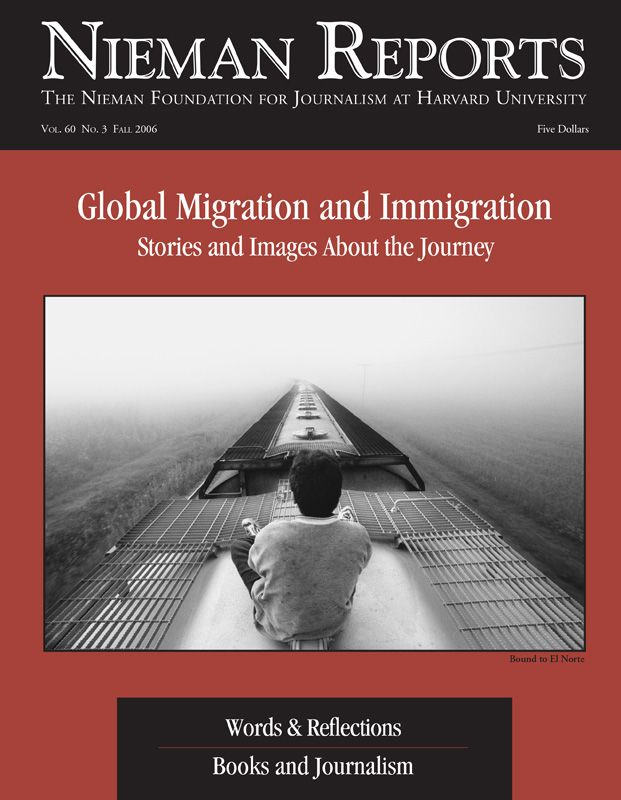This spring, editors at The Star-Ledger posed a question as the immigration debate was heating up in Washington, D.C.: How can an immigrant living illegally in this country purchase bogus Social Security cards or other documents that are required for them to work here? This question would pull me, as a reporter, into a slice of our community's life that neither I nor many of our newspaper's readers know very much about.
In New Jersey, we knew temporary job agencies in immigrant-heavy cities like New Brunswick and Elizabeth sometimes serve as document mills, selling such false papers to these workers. We knew this because our paper's immigration reporter, Brian Donohue, wrote last year about the places with offers of Trabajo Inmediato, or "Immediate Work," painted in their windows. We also followed such coverage being done by reporters in New York and on the West Coast who had written "gotcha" stories by confronting street sellers who produced fakes within hours for cash.
Even though I don't normally report on immigration, my editors chose me for this assignment because I'm fluent in Spanish and able to pass for someone here illegally looking to work. Taking the more traditional route, this had proven to be a very difficult story to report, as Donohue had found out. "When I tried to go through the front door, I couldn't even get into the factory," he said. He regarded my back-door approach into the story as justified because of the difficulties he'd encountered when trying to report on the shadowy life of these workers.
For our newspaper, this was an important story to share with our readers, given the big impact these illegal workers have on our local economy and the questions being raised about changes in federal policy regarding how those who came to this country illegally should be treated. "When you have someone go through the process and is able to say, 'This is what happens to an immigrant worker,' it hits home with readers," said Assistant Managing Editor Suzanne Pavkovic, who oversees immigration coverage at the paper.
Fitting In
Speaking only Spanish, I started my journey in May on the streets of Elizabeth, a port city of about 125,000 where about half the residents are Hispanic. To those I met, I asked only, "How do I get papers?"
I didn't expect what happened next.
Shopkeepers and people on the streets seemed puzzled that I would be so brazen. All I would have to do, they told me, was get a job and then rely on immigrant coworkers to hook me up with document sellers. So I walked into a temporary job agency in Elizabeth and let them know that I had no work papers.
"We will take care of papers later," said the agency's manager, who gave me a job application.
I gave her my name and address, but no telephone number. Ten minutes later, I was being driven to work at a L'Oreal hair products warehouse for a day, where a Mexican who had entered the country illegally, and was relying on bogus documents to work, offered help.
Taking things slowly, I eventually paid him $140 to broker a deal with a seller. Within a month, I had a fake Social Security card and green card and, with these in hand, I would be able to work anywhere.
I also now had the information I needed to write my story, even if I never planned on having to actually work at a job to get the identification papers I needed. What I didn't have — and still don't have — is a clear understanding of why most of the people I had to confront about what had transpired in securing these documents were willing to talk so openly with me about the holes in the government's current policy to curtail illegal immigration, even after I told them I was a reporter.
Developing the Story
When I returned to each of the locations I'd passed through posing as an illegal worker — as I worked to put my experiences on the record — the temporary job agency's staff, the warehouse manager, his corporate bosses, and the Mexican intermediary and almost everyone else, agreed to talk to me. Each offered an "it wasn't me" explanation for what had happened:
- The temp agency manager deferred to the owner of the business, who blamed employee oversight for me being sent out on a job site without documentation;
- The warehouse manager claimed it was the agency's job to verify a worker's status;
- A L'Oreal spokeswoman released a statement saying the company had not encountered any problems with its workers or the temp agency in the past.
What had been such a straightforward and relatively easy process for me was now being portrayed by its participants as an anomaly. But because I'd documented what had been happening, and we now had participants speaking on the record who were not disputing the facts of what had happened (even if they were trying to shuffle the blame), we now had what one of my editors called a "bulletproof" story, albeit one that took some nontraditional reporting to land.
The Ground Rules
In our approach to gathering this information, we knew there was a fine line between reporting and misrepresentation. My editors and I agreed that in seeking information and documents I could only offer responses to what was asked of me — nothing more. The other ground rules were obvious: never lie and never risk my safety.
After the story appeared on July 23rd, it received positive feedback from those on both sides of the immigration debate, but there was some negative reaction as well. A journalist from Colombia living in New Jersey left me a message saying I had done a disservice to all immigrants. I had violated their trust, she told me, and put their jobs and livelihoods at risk. "I am ashamed to think I am in the same business as you. I hope you can sleep with a clean conscience," she said.
Naturally, I worry whenever illegal immigrants go on the record and, in doing so, possibly face deportation or termination from a job. But neither the newspaper nor I have yet heard of such consequences arising from our reporting on these issues. Certainly, those who engage in these illegal activities take a risk merely in doing what they do, and none seemed too surprised when I approached them as a reporter.
One thing I did learn in my reporting on this story was about the willingness of people whose lives might be in jeopardy from such public exposure to understand why I was doing the story. I worked hard to communicate to them that my intent was not to exploit them; what I was trying to do was offer readers a fair description of the challenges their life circumstances present to them. And the only way I could do this effectively, I explained to them, was with their cooperation.
Days after purchasing my bogus papers, I called Arturo Inclan, the Mexican middleman who brokered the document sale. First, I mentioned that I noticed my surname had been misspelled on my fake Social Security card. "Do not worry. Just make sure that if you have to sign your name on any forms, while presenting the card, that you use the same spelling," Inclan told me. I thanked him for that advice, and then I requested another meeting. "Everything is fine, but I want to talk to you about something very important," I told him.
Within a day, we met outside the temp agency. I had replaced my red sweatshirt and ripped jeans with a tie and dress slacks. Inclan looked puzzled but smiled and shook my hand. Indeed, it was difficult for me to explain to him that I was not who he thought I was. "I want to thank you again for your help, and tell you that I am a reporter, working on a story detailing how immigrants purchase fake working papers. There, across the street, are two colleagues of mine," I said, pointing to photographer John O'Boyle and Donohue. It had been decided that I shouldn't confront any of my sources alone. And as I told this to Inclan, Donohue later told me that he had the look of "the deer in the headlights."
He agreed to speak to us for the story. His only condition was that no photos be taken of his face. Instead, O'Boyle shot Inclan from behind as he pushed his bicycle along the sidewalk on the way to a small park where we sat for an interview. Even with his approval, I could not help feeling awkward.
"It is all right, Rafa," Inclan said smiling. He insisted he was not the seller of the documents that I purchased, and that he had not profited from the sale. His only reason for helping me, or any immigrant in need, he said, was compassion.
"It is what we do for each other," he said.
Ralph Ortega is a reporter with The Star-Ledger in Newark, New Jersey.



